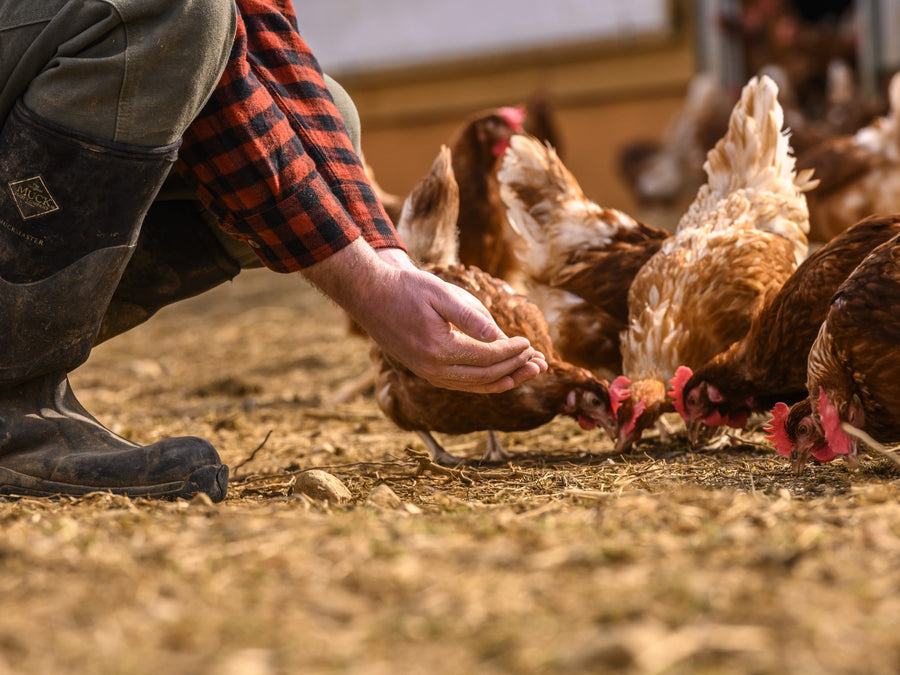
The Secret to Quality Eggs? Nutrition Matters
You are what you eat, as they say.
We all know that a good diet is essential to good health. That's one reason many of us eat eggs. And yet, too often we don't do a great job with our own nutrition or at balancing nutrient-dense foods with less satisfying ones. At Pete & Gerry's, our Certified Humane pasture-raised and free range hens find getting a healthy and balanced diet a little bit easier. To begin with, their “treats” are finding insects in the grass. And when it comes to their main food source, they get the benefit of PhD nutritionists as their personal chefs, something few of us enjoy.
The feed behind Pete & Gerry's Eggs
Just like us, hens’ dietary needs change with age, health, season, and a range of other factors. Because of this need for continuous adjustments to the feed mix, our farmers’ feed advisors employ PhD poultry nutritionists to carefully formulate the diets and adjust them as needed. Using these formulas, feed suppliers create the rations using high-quality ingredients, and deliver the feed to farms. Although our farms may use different feed mills depending on their location and unique needs, each of the mills takes great pride in the quality of their feed.
“People food is in the stone age compared to what these hens get for balanced nutrition,” says Les Morrison of Morrison Custom Feeds in Barnet, Vermont, another Pete & Gerry’s feed supplier. Feed mixtures are developed with a careful eye, making sure that a hen's every nutritional need is met in terms of nutrients, protein, sodium-balancing bi-carbonates, ground limestone for developing a strong egg shell, electrolytes, and much more.
The feed powering hens at factory egg farms
Contrast that to the giant factory farms producing a large majority of the eggs sold today, which use a “least cost formulation” for their feed. That means exactly what it sounds like: the cheapest possible feed that will give the hens enough calories to lay eggs that day. This results in a difference in a lower quality that you can both see and taste.
There is a lot of science involved in our feed formulation, but one thing you won’t find in any of our feed is pharmaceuticals – unlike nearly all feed used at factory farms, which make up 90% of the eggs sold in the U.S. According to Morrison, these pharmaceutical additives are like putting a Band-Aid on a cut that needs stitches. “The way to keep birds healthy, besides feeding them properly, is to make sure their living environment is clean and not overcrowded” he says. “Good egg farmers are in their barns every day. They can see problems before they happen, sometimes just by listening to the birds."
Why corn and soy?
We're proud to use high-quality soybeans and corn in our hens' feed. The soy is a great source of additional protein, while the corn provides necessary carbohydrates. Although there are cheaper alternatives to corn and soy, they typically aren't as effective and can decrease egg production and even egg size, which can pose problems both for our partner farmers and our consumers. This is why most eggs sold in grocery stores are laid by hens who eat some amount of corn and soybeans, and why soy-free feed is typically only used for small backyard flocks.
When our hens consume this supplemental feed, their bodies metabolize its nutrients, changing the protein structure into a form that is usable for them. By the time the eggs are formed, the presence of soy phytoestrogens has declined. This means that soy allergies shouldn't be a problem for anyone consuming our eggs, but if there are any concerns to this nature, we always recommend checking in with a healthcare provider before consumption.
The healthy, humane difference
We don't treat our Certified Humane pasture-raised and free range hens like they are nothing more than food-producing machines. Instead, we treat each flourishing flock with attentive care, offer them an abundance of freedom to frolic in both the pasture and barn at night, and nourish them with balanced high-quality feed.
Morrison concludes, after admitting to a weakness for potato chips in his own diet, that if he were to die and come back as a hen, he would hope to be a Pete & Gerry's hen.











